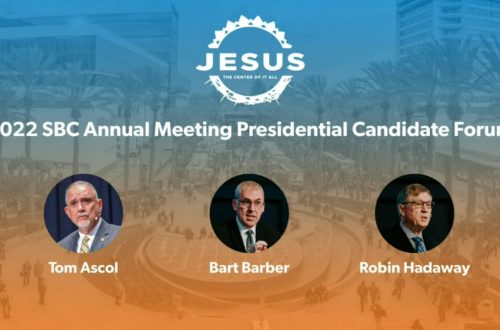 I’m elated to have received from Amazon.com my copy of God’s Indwelling Presence by my good friend Jim Hamilton. I will eventually post a review of this book, but I want to bring your attention to it now.
I’m elated to have received from Amazon.com my copy of God’s Indwelling Presence by my good friend Jim Hamilton. I will eventually post a review of this book, but I want to bring your attention to it now.
This book makes the provocative claim that regeneration and indwelling are not the same things. Jim argues that while Old Covenant believers were regenerated by the Holy Spirit, they were not indwelt. New Covenant believers are both regenerated and indwelt. The seminal text in Jim’s study is John 14:26: “The Spirit of truth, whom the world cannot receive, because it does not see Him or know Him, but you know Him because He abides with you and will be in you.â€
 Jim will be speaking this weekend on the topic of “God’s Indwelling Presence†at The Northbrook Conference in Cedar Rapids, Iowa. Doug McHone of CoffeeSwirls will be live-blogging conference, and recordings of Jim’s talks will be available after the close of the proceedings.
Jim will be speaking this weekend on the topic of “God’s Indwelling Presence†at The Northbrook Conference in Cedar Rapids, Iowa. Doug McHone of CoffeeSwirls will be live-blogging conference, and recordings of Jim’s talks will be available after the close of the proceedings.
Even if you won’t be attending the conference or catching the live-blog, you need to buy this book. Jim is one of the most prolific young scholars in evangelicalism today, and this new work promises to be an important contribution.




4 Comments
dennyrburk
1. Jared Says:
October 13th, 2006 at 1:25 pm
Denny,
What practical implications does that have for OT believers verses NT believers in daily life? Did OT believers not have the santification process and if not what does that say about being kept by God (preseverance of the saints)?
Thanks,
Jared
2. dennyrburk Says:
October 13th, 2006 at 2:49 pm
Jared,
One of the important results of this study is to show that OT believers did participate in the regenerative work of the Spirit, though they were not continually indwelt by the Spirit. Continual indwelling by the Spirit is an exclusive feature of the New Covenant, and it is what Jesus was referring to when He said that “He will be in you.â€
Thanks,
Denny
Jared Edwards
To say the difference is prepositionally is dancing around the periphery of the issue. The central difference is redemptive historical rather than existential. It does have existential implications as mentioned in 2 Cor 3 and Gal 3 & 4. Indwelling accompanies regeneration. Being regenerated and not indwelt does not help out a lot. That would say that you can have power over sin without the Holy Spirit. That is putting a lot of confidence in fallen sinful man.
Jared Edwards
I see that you lost my previous response. I would be interested how this position interacts with my comment. Here is what I posted a few days ago.
There are a lot of issues to sort out to support the redemptive historical position vs. the prepositional position that is widely held in the dispensational circles. I hope to write something more when I have time but here are some initial thoughts.
I would be interested to see how that interpretation of the text coheres with the rest of John’s Gospel (epecially John 7:39, 16:17). It seems to me that those who hold to the “prepositional” interpretation would miss the forest for the trees having a tunnel vision reading of the text. They go from grammar rules of prepositions straight to the conclusion without seeing if it biblical-theologically coheres with John and then with the rest of the NT then the rest of Scripture. How does it cohere with Luke on Pentecost? How does it cohere with Paul in 2 Cor 3 and Gal 3 & 4? What is his interpretation of 2 Cor 3 and Gal 3 and 4 and did he get that? What would he say the difference is between Gal 3 & 4? What is the redemptive historical and existential tension?
Those are some hard passages that bear a lot of weight that are very redemptive historical in nature. To write a book having John 14:17 as your starting proof text and trying to have the weight of scripture fit in its framework would be an arduous task. I am not saying he is because I have not read the book, but that seems to me how most of the arguments go for this view.
The idea of being regenerated and not being indwelt does not agree theologically with Scripture. The NT term of regeneration is renewal unto glorification. The theological technical terms implies indwelling. If you have regeneration without indwelling you are still under the bondage of sin. Do we have the ability to conquer sin without the Holy Spirit? That would be pretty arrogant to say.
I would be interested to see his view of ordo salutis? Does he hold to a Perkinsian model where calling, regeneration, justification, adoption, sanctification, glorification are sequential links in a chain where you can have one without possessing the other? For example, at this point of my Christian life I am at regeneration then I go to the next link, etc?
I am pretty sure the significance is redemptive historical Christological, not existential; economical not ontological.
Jesus is not saying that that difference between now and Pentecost is that now the Spirit is with you and then He will dwell in you afterwards. Rather He is saying, “You know the Spirit of truth because He is with you in me. The Spirit I am going to send you is a Spirit you are already able to recognize. You have seen the manner in which the Spirit has worked in my life. The reason the world does not recognize the Spirit is that it does not recognize Christ, the bearer of the Spirit.”
The transition then from Old to New is not merely the Spirit being with the disciples and in the disciples. It is a difference that bears with it a Redemptive-Historical difference. The difference between the disciples who have experienced the Spirit who has dwelled in and on the Lord Jesus without diminution of measure, and then experiencing that one and the same Spirit who was with them in Jesus now dwelling in them pursuant to the event of the Day of Pentecost.
Consider Jn 16:17. Why can’t the counselor come to them? Because the counselor that is going to come to them carries with Him this economic identification with the Incarnate Son and therefore for him to come as the One who has seen the Incarnate Son through to the completion of his work on his ascension. For him to come in this distinct capacity as the Spirit of the Lord Jesus Christ it is necessary for Jesus to go from them and to complete His ministry in the ascension in order to receive from the Father the promised Holy Spirit and give that Spirit to the Church.
Jesus breathing on His disciples is an echo of Gen 2:7 coalescing with what Paul says in 1 Cor 15:45ff. That in the resurrection and the ascension of the Lord Jesus Christ, Christ came into such possession of the Spirit by which he was possessed in his ministry. At the resurrection and ascension as the Second Man, the Eschatological Adam, He becomes a life-giving Spirit. So that there is not ontological confusion between the Son and Spirit there is an economic coalescing in such a way that for the rest of the NT to have the Spirit indwelling us is to have the Son dwelling within us.
Ultimately, ephocally speaking, the giving of the Spirit in the Old vs. New is parallel to and dependent on the difference between the knowledge of Christ in the old administration and the knowledge of Christ under the new administration. The Spirit given to the Church on the Day of Pentecost in Johanine terms and it has its an analogy in the Pauline writings may be described as the “Spirit of the Lord Jesus†because He is actually the One and the same Spirit who historically in the space-time continuum abode on the life and equipped the ministry of the Lord Jesus.
All of this must be seen under the over-arching goal of the purpose of the Spirit’s ministry nothing less that the reproduction of the image of Christ. The Spirit will take you and reform you back to Adam, but will not stop there but will take you forward where Adam was destined to where Adam was called where Christ went in His resurrection becoming the eschatalogical man whose image ultimately the Spirit means to restore us.
Everything that flows from this context is answering the question, “By what means and through what instruments and what events does the Spirit bring us as ‘new era’ believers to the consummation of that new era in the transformation of our old beings into the new creation in Christ.” This I think we begin with union with Christ as our model for relating the work of the Spirit in salvation with the aspects of calling, regeneration, justification, adoption, sanctification, etc. These not being links in a chain or a causality deistic model, but we possess these because we are in Christ who by his incarnation, death, resurrection, ascension is the justified one, the adopted one, the sanctified one, etc.
Eric Schumacher
The audio is now available for free listening:
http://thenorthbrookconference.wordpress.com/fall-2006-archive/